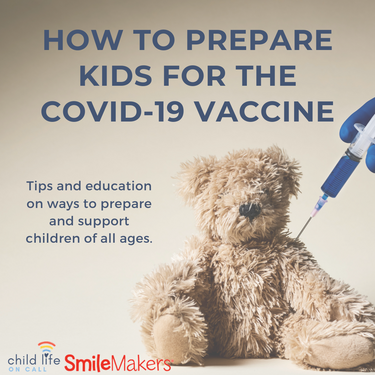
Dr. Anthony Fauci, the government’s top infections disease doctor, said on Friday that he believes that children will hopefully begin to get the COVID-19 vaccine as early as Spring 2021 (according to the Associated Press article here).
So, while there is a lot of unknown, let’s stick with what we do know. Treatment rooms for pediatric procedures work because the rooms are designed for efficiency and coping. From stocked supplies for nurses to distraction items and decor for children, these rooms are standard practice because it works. Patient don’t have to associate their rooms and beds with painful procedures – they can happen in the treatment room. The same can be true for vaccines and immunizations.
While we can’t predict exactly when, where and how children will get the COVID-19 vaccine, we can prepare ourselves and our children for the vaccine. Because many children associate shots with pain, it’s good to get a head start on the conversation and begin to prepare how your hospital and or medical office will give the vaccine.
This vaccine requires two shots several days apart which means a positive first experience can help how a child will cope with the second. If the first vaccine experience is associated with a lack of control, discomfort and pain, it is likely that the second experience will be similar.
So, how do we get ahead of this? I have a couple ideas and I’d love to hear yours, too.
First, create an “immunization station” experience much like a treatment room.
If vaccines are administered while the child is hospitalized and before discharge, advocate for the procedure to be offered in a different room away from the child’s patient room. Use these decals to make the room more patient-friendly and educate about the WHY.
Second, prepare the child by sticking with the facts:
Third, offer choices (that are actually choices):
Fourth, when the procedure is over, talk about what worked and what didn’t:
Fifth, reinforce positive behavior
If you’d like to download a PDF of these strategies, you can do that here.
